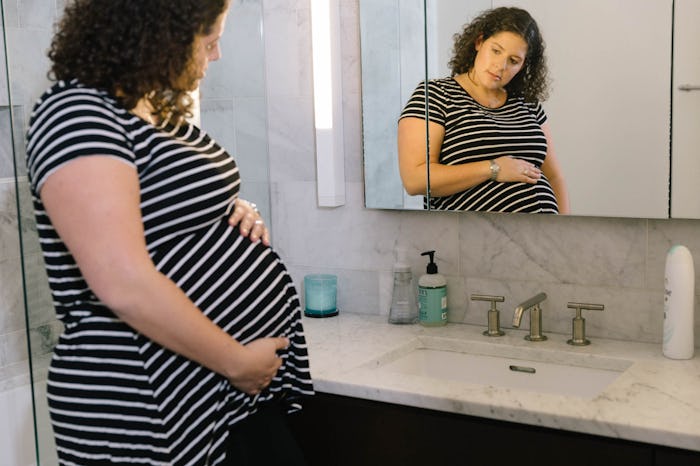Life
What Your OB-GYN Wants You To Know About Requesting An Induction
The end of pregnancy is like the end of the world. Infrastructure and government crumble (you've quit doing housework or grocery shopping), and citizens revolt (your other kids demand you resupply the Goldfish). Time slows to a crawl, and if it weren't for your dignity, you would, too. At some point in the sciatica-riddled final weeks, when you feel like a parade float and have to pee every half hour, you throw up your hands. Can you request to be induced? Because you feel like you've been pregnant forever.
Megan Schmitt, MD, is a Park Nicollet OB-GYN who delivers at Methodist Hospital Family Birth Center in St. Louis Park, Minnesota. In an email interview, she explains that doctors follow strict guidelines, and for good reason. While babies are considered full term after 37 weeks, the Eunice Kennedy Shriver Maternal-Fetal Research Center recently took a closer look at babies born via elective induction. According to Schmitt, an induction is "elective" when there's no medical reason for it — if the mother is uncomfortable, for instance, or invested in a particular birthdate. She writes:
"These researchers noticed a trend in admissions to neonatal care units. When they dug deeper, they found that there's still fetal lung development that occurs between 37 and 39 weeks . . . because of this, there are new recommendations against elective inductions and there's a big push to reduce them."
Indeed, Schmitt strongly advises women to wait for labor to start on its own — as do organizations like Lamaze International and The March of Dimes. "We now think part of the natural labor process may be triggered by fetal lung development," notes Schmitt. So if you're nearing your due date and wondering what's taking so long, consider that your baby might be putting the finishing touches on a crucial organ system, and don't rush. Another thing to keep in mind? Due dates are frequently inaccurate, reported Fit Pregnancy's Jeanne Faulkner, RN. Which means it's possible to induce at what everyone believes is term, and wind up giving birth to a premature baby.
Experts estimate that up to 50 percent of inductions are elective, as Faulkner reported, and you can request to be induced around 39 weeks. However, it's important to ask your OB about their policy well in advance.
"I usually start the conversation about induction of labor right away, at the very first visit with my patients," explains Schmitt, who no longer performs elective inductions. She does induce for medical reasons, or when a patient is overdue.
There comes a point in every woman's pregnancy when she just wants to "get the baby out." While sympathetic, Schmitt gently reminds patients that it's safest to wait for labor to begin naturally. If you're considering an elective induction, ask your doctor for their honest opinion. And remember: no one has ever been pregnant forever, despite how it may feel.
